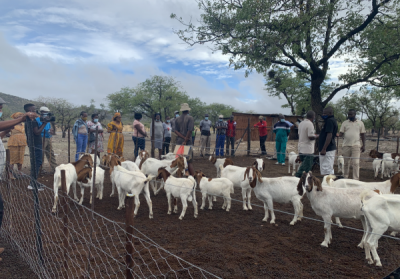
The Improving Rangeland and Ecosystem Management Practices of Smallholder Farmers Under Conditions of climate change in Sesfontein, Fransfontein, and Warmquelle areas of the Republic of Namibia project known in short as (IREMA) Project. The GCF availed (N$ 130, 000,000.00) for the IREMA project and the Ministry of Agriculture, Water and Land Reform (MAWLR) in conjunction with the Environmental Investment Fund of Namibia (EIF), is implementing this project from 2019 to 2023. The project aims to reduce the vulnerability of smallholder farmers under climate change conditions by safeguarding natural capital that generate ecosystem services to sustain agricultural production systems.
The IREMA project is the Green Climate Fund’s (GCF) first approved project under the Simplified Approval Process (SAP). The project area focuses on the vast Kunene Region in north-western Namibia, grappled with the impacts of climate change with forecasts predicting increased lengths of the dry season. The most vulnerable populations, are small-scale and subsistence farmers, mostly women, whose livelihood depends entirely on livestock and rain-fed agriculture for food security and income. To project will aim to reduce the vulnerability of smallholder famers and invest in climate-smart agriculture techniques by improving access to water and increasing both livestock and crop production.
The handed over goats, fodder and fuel-efficient stoves were valued at N$ 3.2 million and the event was officiated by the Minister of Agriculture, Water and Land Reform, Hon. Carl Schlettwein. The minister highlighted that noted “This initiative is in line with the Fifth National Development Plan (NDP5), Harambee Prosperity Plan, MAWF strategic Plan of empowering the least privileged communities and reduce disparity in income gap and the Environmental Investment Fund of Namibia’s Strategic plan which is committed to vigorous resources mobilisation that is geared towards the improve of livelihood of all Namibians and sustainable use of Namibian resources for all her people”.
IREMA Kunene Project’s Small Stock Revolving Scheme is complementing the Small Stock Development and Distribution to Communal Areas” (SSDDCAs) which is a capital project initiated by the Ministry Agriculture, Water and Land Reform. This scheme is aimed at providing quality core breeding flock of suitable goats to selected vulnerable households to gain a sustainable means of income generation and enhanced food and nutrition security while improving their social and economic well-being.
The ceremony laso saw over 400 Does and 20 Bucks being handed over for the Kunene Region. The value of the goats, fodder, medicine and vaccine is estimated at Nine Hundred Thousand Namibia Dollars (N$ 900 000.00). Twenty (20) selected beneficiaries will each receive (20) does and one (1) buck. A Revolving Agreement will be signed between the Ministry and the beneficiaries to ensure that goats are used for intended purpose. As per the Revolving Agreement the beneficiaries are expected to revolve the first 10 does during the 3rd year, the next 5 does during the 4th year and the last 5 does during the 5th year.
The handover also witnessed the handover of energy-efficient stoves to rural poor households valued at One Million Namibia Dollars. By 2023, the IREMA Kunene Project has a target of procuring and to consequently distribute stoves to more than 1000 stoves to vulnerable households valued at approximately Four Million Namibia Dollars (N$ 4,000,000.00). This intervention is expected to reduce the deforestation rate due to minimized utilization of firewood by the beneficiaries.
Another milestone was the handover of fodder for distribution to farmers at cost of 1.2 Million Namibian Dollars. This fodder is an intervention to address the devastating impacts of drought that Kunene region continues to experience. The project plans to develop the Khowarib Green Scheme plot of nine (9) hectares at Sesfontein Area for intensive fodder production on a large-scale using climate-smart technologies at a cost of approximately Fifteen Million Namibian Dollars (N$ 15 000 000). The plan to develop this Green Scheme includes but not limited to the rehabilitation of the three boreholes, installation of climate-smart irrigation systems and renovation of the existing fodder storage facility and fence.
The intervention through this project will contribute to the attainment of the Country’s National Development agenda, MAWLR Strategic Plan 2017/2018-2021/2022 and other legal frameworks which strive to improve agricultural output, build resilience to climate change in communal areas, and enhance food security at household and national levels, in recognition of environmental constraints and vulnerability as well as human development needs. Furthermore, the interventions of this project will benefit a total of 44,400 beneficiaries.

Figure 1 Beneficiaries are seen here with their goats




